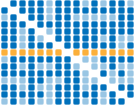A népek atyja (Hungarian)
Istenkirály ki volt korlátlanabb, hatalmasabb?
Ő volt az út, az igazság, az élet, s főként a halál;
világa egyszerű, mint az orosz ruletté,
a piros golyó: azonosulás, a fekete: kivégzés ...
Egy röpke emberöltő, s látni ledöntött szobrainak élő modelljét –
a kisnövésű, bosszúálló, szorgos szervezőzsenit,
aki bicskával nyúlt bele egy működő óra szerkezetébe,
mert nem érte föl szívvel az eszmét, melynek nevében ölt.
Istenséghez isteni képzelőerő kell,
a kemény stratégia mellé egy csipet költészet is –
lélek és lelkiismeret nemcsak szivárványos szavak,
a hazugság előbb-utóbb kirohad a szilárdnak szánt kötőanyagból,
s a sírkőfaragó idő tüszkölve vési be a nemrég még rettegett cár nevét
Xerxész és Al Capone neve mellé, a közös emlékezetbe.
| Publisher | Magvető Kiadó, Budapest |
| Source of the quotation | Orbán Ottó összegyûjtött versei |
 |
|
The Father of the People (English)
Which monarch-cum-deity had fewer restraints or more power?
His was the way, the truth and the life, but chiefly the death;
his world was as simple as Russian Roulette,
the red ball, obedience: the black, execution...
A brief generation, to see his fallen statues' living original –
the short-assed, vengeful, industrious genius of organisation,
who dickered with his penknife in a functioning watch,
because he failed to grasp the ideal in whose name he murdered.
Divinity requires a godlike imagination,
a pinch of poetry to go with the hard-line of strategy –
conscience and soul are not merely words in a spectrum,
sooner or later the lie starts to rot in the firm-looking binding,
and chronically sneezing, time, the monumental mason, carves on the
tombstone
of common memory: Xerxes; Capone; the once fearful name of the
emperor.
| Publisher | Bloodaxe / Corvina |
|
